











Smith & Smith - Russian Language Services
School Link - Page 1

Photographs taken 25 December, 1996 during visit to school in Sestroretsk,
north-west of St. Petersburg, Russia (click on image to get larger, jpg
version).
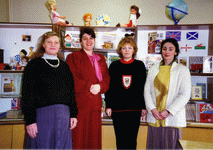
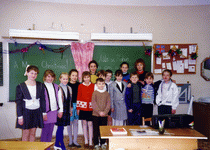
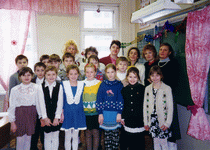
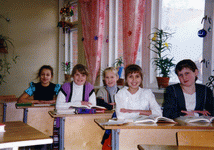
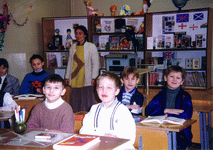
St. Petersburg School Link
Background
Alla's cousin, Vera, teaches English at a school in
Sestroretz near
St. Petersburg. Prior to our holiday for Xmas and the New Year in 1996/7
Vera asked by telephone if we could bring some English text books
suitable for her pupils, and a wall chart to illustrate the English
alphabet.
Thanks to the help of a North Tyneside councilor, a variety of books
surplus to the North Tyneside schools library service was supplied to us
and these were packed with wall charts from local book shops and taken
with our usual luggage to St. Petersburg.
About Tokareva School (No. 435)
The school is located in the north west of St. Petersburg, in the town
of Sestroretsk, by the Gulf of Finland. It is a comprehensive school
with over 1000 pupils in the age range 7-17 years. In 1995 the school decided to
intensify its teaching of 2 foreign languages,
English and German. These languages are being taught to children in the
age range of 8 to 17 years.
December 1996 School Visit
We visited Vera and her family on the Sunday before Xmas. I asked to
either visit the school or at least to have some photographs taken of
the school during a normal working day. Vera arranged for our visit on
the normal working day of 25th December! We took part in two English
lessons led by Vera for her pupils of 8-11 years of age. They had been
learning English since September '96 only, so their ability was limited,
but each pupil was able to introduce him/herself and was able to answer
simple questions from a prepared text about how English children
prepared for Father Xmas. All of the children in the two classes had
prepared Xmas greeting cards and presented them to us one by one! The
second lesson was attended by the schools' Deputy Director (deputy
head), the head of English and a third English teacher.
We took several photographs of pupils and teachers which show clearly
how they enjoyed the occasion.
Later we were entertained for lunch and visited the school's Director in
the company of the Deputy Director. The Director told us that the school
held an annual concert, involving some 600 of the pupils and that
visitors from North Tyneside would be welcome to the next concert in
April '97. Photographs of singing/dance groups were shown to us,
including some that had travelled abroad for festivals in Italy, Germany
and Belgium. The school has been invited to sent a group to Portugal
next year ('97).
On our farewell we were presented with a bottle of champagne for the
councilor and I kissed both the Director and Deputy Director 'goodbye'
- both female - we did not see any male teachers - teaching of school
children is still primarily the task of women in Russia.
RS October, 1998
Director (Head):
Paramonova, Lidia Markovna (Парамонова, Лидия Марковна)
School address:
189640, St. Petersburg, Sestroretsk, Tokareva Street 5, School No. 435
Fax: 00 7812 437-31-00
Tel: 00 7812 437-31-00
Secretary: 00 7812 434-71-02
Deputy Director (Head) of School - Tatyana Yakovlevna
Head of English - Tamila Zakcharovna
English Teacher - Vera Victorovna
English Teacher - Nadezhda Alexandrovna
Tokareva School (No. 435) in Sestroretz
(Article provided by school, October, 1998 - slightly edited)
Since the establishment of the school in 1990/91, we, the staff serving
at the school, have worked together to achieve the same vision. We believe
that, pure scholarship aside, it is of prime
importance that our pupils walk out of our school gates every day never
doubting that they are anything less than a success. With this in mind
we constantly strive to ensure that our pupils are given every
opportunity to realise their potential and to discover and develop new
abilities. We work tirelessly to prove to every one of our students that
they each have talents and characteristics inherent within them which
are valued, unique and irreplaceable.
The school's composition
According to a 1997 independent survey of the economic background of our
students, we have enrolled within our school children from the whole
range of income:
-
Civil servants
-
Industrial
-
Unemployed
-
Large families
-
Families below the poverty line
We are proud to say that the vast majority of our children are
independently self disciplined in their approach and dedication to their
studies. Many of them would feel themselves simply lost within the more
typical, traditional educational framework.
In awareness of this our school operates in strict adherence with the
following principles:
-
To give meaningful and comprehensible tasks
-
To constantly observe and develop the children
-
To heighten their cultural level
-
To develop each child's sense of responsibility, both within and without
the school environment
Helping us to achieve these principles we have with us 86 teachers, of
whom over half have displayed consistently outstanding levels of
professionalism:
-
3 are deemed of the highest rating (Vishya Categoria)
-
20 are deemed of the 1st category (Perviya Categoria)
-
30 are deemed of the 2nd category (Ftoraya Categoria)
-
1 is deemed a master teacher (Zacludjenie USSR)
-
3 are deemed candidates of technical research excellence
Thus we are fortunate enough to have serving within our walls teachers
who would generally be deemed sufficiently qualified to teach at
University level. Their goal and enthusiasm is simple: to enable the
pupil, while studying, to develop the intellect to the fullest possible
extent. Generally it seems that the professional world differs in few,
indeed, if any ways from the children's world. Our cultural focus is
different: to encourage less the maximum of specialisation than to help
develop and bring to fruition in the child the maximum life energy,
sincerity, freshness in attitude, and hopefully, to encourage the
germination of original self expression. We at the school believe that
the fundamental emphasis required to nurture originality is simple, that
above everything it is necessary to know and love the children.
The hands on approach
(The children get their hands dirty!)
One of the ways we use to demonstrate the development of the school
children's abilities to both themselves and, of course, their parents,
is by holding a student-organised concert every October. This has become
a traditional event in the school calendar alongside the end of the year
concerts in April which are run by each of the Arts faculties. In all of
these events the pupils are encouraged in every way to utilise their
creative faculties and initiative. Pupils have the opportunity to turn
their hands to roles as diverse as writers, actors and producers. For
many of those taking part the concerts provide an ideal opportunity to
put into practice what they have been taught and to develop (hands on) their
creative
skills.
We work together as a team
We also maintain our links with parents by holding monthly
councils with them. We also liaise and work directly with the local
nursery schools. We have created and sustain mutual support programs with
three nursery schools in particular. This allows teachers to acquaint
themselves with both the students and their families from the very
earliest stages of the child's life.
Our building
We would like to take this opportunity to point out the unique interior
decoration of our school which has been accomplished solely by the
efforts of our pupils and teachers. Our theme is the flower. Almost all
of the pupils played a direct part in the creation of their
surroundings, with special attention being paid to the school stage and,
of course, the corridors. We maintain the scheme all over the school
down to the cafeteria tables which the children maintain
themselves. Our corridors are decorated with designs of holly and rowan.
In 1997 the council of students decreed that the school become 'green'.
This led to the appearance of flowers throughout the school corridors
and classrooms, and this is also maintained by the students.
We have worked hard to give each classroom its own character. We have
phased this in as much as possible, by subject. So every subject area
from infant classrooms to that for information technology, from the
foreign languages department to the cafeteria suite has its own special
decorative identity.
Our mission
In brief, we have made the decision to pursue the following goals:
-
To develop the potential of our students to enrich their lives and
social ties both within and outside the school walls.
-
To heighten the interest of our pupils in their studies, in all the
varied aspects of their school life, and to give them the foundations
necessary to find, or make a place in life for themselves, that they
want to inhabit.
-
To create and sustain a friendly microcosm in which to achieve these
goals, and facilitate high cohesion.
-
To prepare our students for real life - to arm them with the basis of
knowledge - to enrich their lives and help them eagerly acquire new
experiences.
-
To heighten interest in the school itself in the belief that an awareness
of its business is conducive to the improvement of interaction between
the school families and the children.
The creation of the necessary conditions for the personal development of
the student demands a friendly atmosphere - at atmosphere of joy,
competition and friendship which can not be manufactured immediately
but gently nurtured over the years through the formulation of traditions
and from the well rounded experience from which arises the hope which
gives any pupil the confidence to reach out and grasp the fruits of a
full life.
The school's clubs
Our school's groups have also enjoyed a great deal of success and have
attracted a lot of recognition since the
Kamerton choir
received the
'Grand Prix' in Gdansk in 1997. The choir also won the St. Petersburg
choral singing contest.
Our folklore group, 'Golden Gates' has been given the honour of
participating in various city and international concerts and festivals.
These festivals included the Russian Agricultural World Fair, and the
town's own Sestroretz Gateway fair in 1997. Other notable occasions
included the Pikalevo Russian Fair and the Constellation Festival in St.
Petersburg. These activities encourage the children's self worth and
expression of interdependence.
Academically the children have more than adequately demonstrated the
depth and quality of their learning in the regional competitions held in
each subject. Pupils from our senior classes have won prizes in
literature and history. We systematically hold intensive Subject weeks
in which all our middle and senior pupils take part.
Our school has performed outstandingly with two of our children
achieving Gold medal standard and two, Silver.
Ongoing research into pedagogic practice
We established in the school a psycho pedagogic department. Its ambit is
centred around the development and evaluation of statistics associated
with the educational process. Thus far we have developed metrics that
have given us insight into the appearance and targeting of the
individual aspiration and specialisation. Interestingly we have
developed metrics to aid us in the measurement of the assimilation of
information by the child that have shown us areas where perhaps the
workload could be extended of contracted so as to aid assimilation. Our
research has been carried out using means ranging from written exams to
questionnaires. These results have helped us guide children towards
various fields such as choreography and theatrics.
We have integrated aspects of the following curricula:
-
Literature and Music
-
Art, Music and Theatrics
-
I.T and English
-
Maths and Music
-
Arts and I.T.
-
History and I.T.
In 1997 metrics indicating the levels of progress of pupils of the first
and middle schools have registered an improvement. The central objective
of the school administration is perhaps the completion of the academic
programme alongside the provision of whatever forms of Social Assistance
we can provide to our students and their families. With this in mind we
have created conditions sufficiently flexible to allow the student to
chose which subjects to study and have built in some flexibility as to
the approach that our students can take to their studies. In the second
half of the school day we run extracurricular clubs which enjoy an
extremely large membership. We have inaugurated programmes which give aid
and the use of facilities to those families who need them most.
The school as a system
(Its ways and means)
The harmonious development of both students and teachers to nurture and
strengthen the generation of the school system depends entirely on the
efforts and the results of work carried out by not only the teachers and
the students but the work carried out by the teachers AND the students.
The school is well on the way to integrating the educational and
humanitarian disciplines, to bringing about a depth of knowledge of the
study material in conjunction with the independent feelings and
experience of the pupil.
In 1997 the school met the requirements for and successfully obtained a
state license. The license confirms the school's status as specialising
in the humanities and the intensive study of language. The director of
the school, Lidia , asserts, with the full backing of her staff,
the principle that no child should ever feel excluded or an outsider,
that, on the contrary, the school should feel, to the pupil, like a
second home. The purpose of any school is to give the child every
opportunity to harmoniously develop his personality and to unlock his
creative potential. Lidia Markovna is deemed so highly by the St.
Petersburg educational authorities that she has been nominated as an
Educational Laureate.
The school is recognised as teaching the following educational syllabi:
-
General Arts - years 1-11
-
English Language (intensive study) - years 1-11
-
General Education - years 1-11
Alongside the mandatory classes of intensive study children have the
ability to nominate their own courses. Entrance to the year 1 is
achieved on the basis of an informal interview, the goal of which is to
ascertain the wishes and interests of the child. Our pupils are given
the opportunity to study from the full gamut of the humanities: music,
choral singing, musical theory, dancing, graphic arts and theatrics.
This all-embracing approach allows the students to develop their own
perceptions and opinions about life, laying the foundations of an
emotional consciousness that is essential for a production and caring
person.
Thus activities such as choral singing can engender within the pupils
the roots of musical interest and give them an insight into the
concepts and creation of musical works.
During the theatrical arts course pupils are given the scope to develop
their ideas and imagination engendering and developing both their
creative and practical abilities.
The musical course is intended to develop the ear, sense of rhythm,
memory and musical literacy of the students which encourages the
children's perceptual abilities which obviously stands them in good
stead for the more academic pursuits.
The dancing lessons develop the students' suppleness and muscle tone
enabling freedom of expression, eliminating mental blocks and
repression, which in turn, facilitates a balanced perception of the
world, thus helping the child adapt to society.
The range of subjects studied by the children is very wide and alongside
their basic studies the children are encouraged to pursue their artistic
interests in studios and clubs. There is a wide variety of clubs at the
school, including dancing, theatre, graphic art and decorative art.
Sport provision is more than adequately covered by the provision of clubs
in sports as diverse as basketball, volleyball, skiing, cycling,
athletics and hiking.






